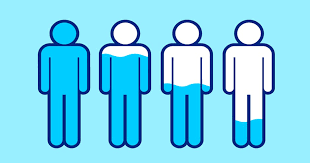5. Headaches

The brain sits inside a fluid sack that keeps it from bumping against the skull. This ensures that your brain isn’t damaged every time you walk or run.
If the fluid in this sack is reduced, your brain can begin to push against your skull. This is one of the most common causes of headaches (7).
Water dehydration also decreases blood supply to the brain, meaning less oxygen and glucose, which can also trigger a headache (9). Before you decide to take advil to relieve a headache, try drinking some water beforehand.
6. Constipation and Poor Digestion

Water helps the body break down food so that your body can better absorb nutrients. In particular, it boosts the absorption of water-soluble vitamins, like vitamin C (10).
The large intestine soaks up water from your food waste to be processed by your kidneys.
Normally, your intestines only soaks up enough water to make your stool the right consistency. However, when you’re dehydrated, it will soak up more water to prevent fluid loss. This leaves your stool hard, making it difficult to push through your digestive tract (11).
7. Fatigue and Lethargy

Fluid loss causes your blood volume to drop and your blood pressure to rise. Your heart has to expand more energy to feed your brain, skin, and muscles with oxygen and nutrients (12). This can leave your feeling tired and sleepy.
In one study, women who weren’t sufficiently hydrated after exercise scored lower on questionnaires assessing mood.
They also found it harder to work and experienced more fatigue and confusion than when they were properly hydrated. Men had similar results (13).

